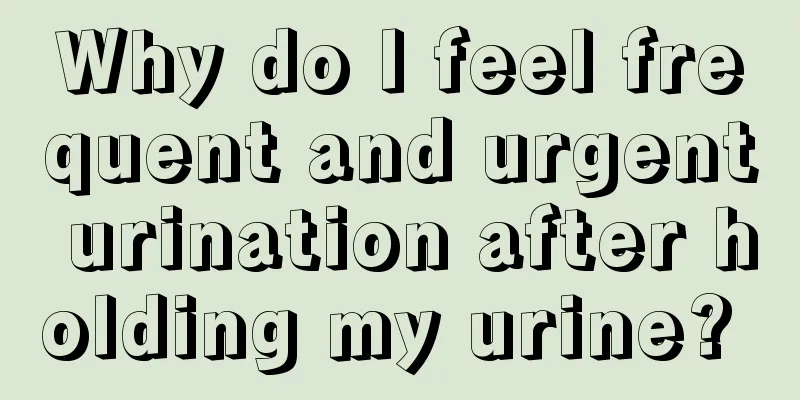Why do I feel frequent and urgent urination after holding my urine?

|
Holding urine is very common for many people, but many patients are prone to frequent urination and urgency after holding urine, and this phenomenon is also relatively serious, seriously affecting our urinary system, so everyone must pay attention to it. Many patients do not know what the cause is, so what is the reason for frequent urination and urgency after holding urine? (1) Increased urine volume: When urine volume increases, the frequency of urination will also increase accordingly. Under physiological conditions, such as drinking a lot of water, eating watermelon, and drinking beer, due to the increase in water intake, the urine volume increases through the regulation and filtration of the kidneys, and the frequency of urination also increases, resulting in frequent urination. Under pathological conditions, such as some patients with diabetes and diabetes insipidus, they drink a lot of water, urinate a lot, and urinate frequently. But there was no discomfort in urination. (2) Inflammatory stimulation: When there is inflammation in the bladder, the nerve perception threshold is lowered, the urinary center is in an excited state, resulting in frequent urination and reduced urine volume (<300-500 ml/time in adults). Therefore, frequent urination is an important symptom of cystitis, especially in acute cystitis and tuberculous cystitis. Other conditions such as prostatitis, urethritis, pyelonephritis, chronic balanoposthitis in children, vulvitis, etc. can also cause frequent urination. Under the stimulation of inflammation, frequent urination, urgency and pain often occur at the same time, which is called urinary tract irritation sign, commonly known as "triuria sign". (3) Non-inflammatory irritation: such as urinary stones and foreign bodies, usually with frequent urination as the main manifestation. (4) Decreased bladder capacity: such as bladder space-occupying lesions, compression from the enlarged uterus during pregnancy, tuberculous bladder contracture, or large bladder stones. (5) Psychoneural urinary frequency: Frequent urination only occurs during the day or before falling asleep at night, and is often caused by mental stress or seen in patients with hysteria. This may also be accompanied by urinary urgency and pain. Through the introduction above, I believe everyone has a detailed understanding of the reasons for frequent urination and urgency after holding urine. Patients must pay more attention to it in their daily lives and try not to hold urine all the time. If you always hold urine, inflammation is likely to occur, which can easily cause great harm to the patient's bladder. This must be paid attention to. |
<<: Why do I have frequent and urgent urination after holding my urine?
>>: What should you pay attention to when you have angina pectoris?
Recommend
The correct way to grow large pearls
With the development of society, there are more a...
What medicine is good for malignant hamartoma
Some patients with hamartoma do not want to under...
Is it normal to have sex three times a day?
Sexual intercourse is a common intimate behavior ...
What food can I eat after laryngeal cancer surgery
Cooking nutritious porridge, nourishing soup... T...
What should you eat to prevent lung cancer? Introducing the most basic high-risk factors for lung cancer
Nowadays, more and more people are suffering from...
What should I do if I want to prevent cervical cancer? Here are three tips to help you prevent cervical cancer easily
Cervical cancer is the main killer that endangers...
Persistent, unexplained back pain is one of the early symptoms of bone cancer
Although many people know about bone cancer, not ...
Where is the best place to treat bile duct cancer
Where is the best place to go for treatment of bi...
What are the functions of Vaseline moisturizing cream
Women love beauty very much. Based on this charac...
What is the reason for the red mole on the body? What is the reason for the red mole on the body?
As we all know, moles are a kind of black protrus...
How to make white clothes bright and white again?
In life, we often encounter the situation of whit...
What are the symptoms of ear neuralgia
Ear neuralgia is not just a symptom, but a common...
What are the causes of acne?
Acne, also known as pimples and blackheads, is a ...
Symptoms of Helicobacter pylori
Intestinal diseases are very harmful. They usuall...
Septic shock
Shock is a common complication in clinical practi...









